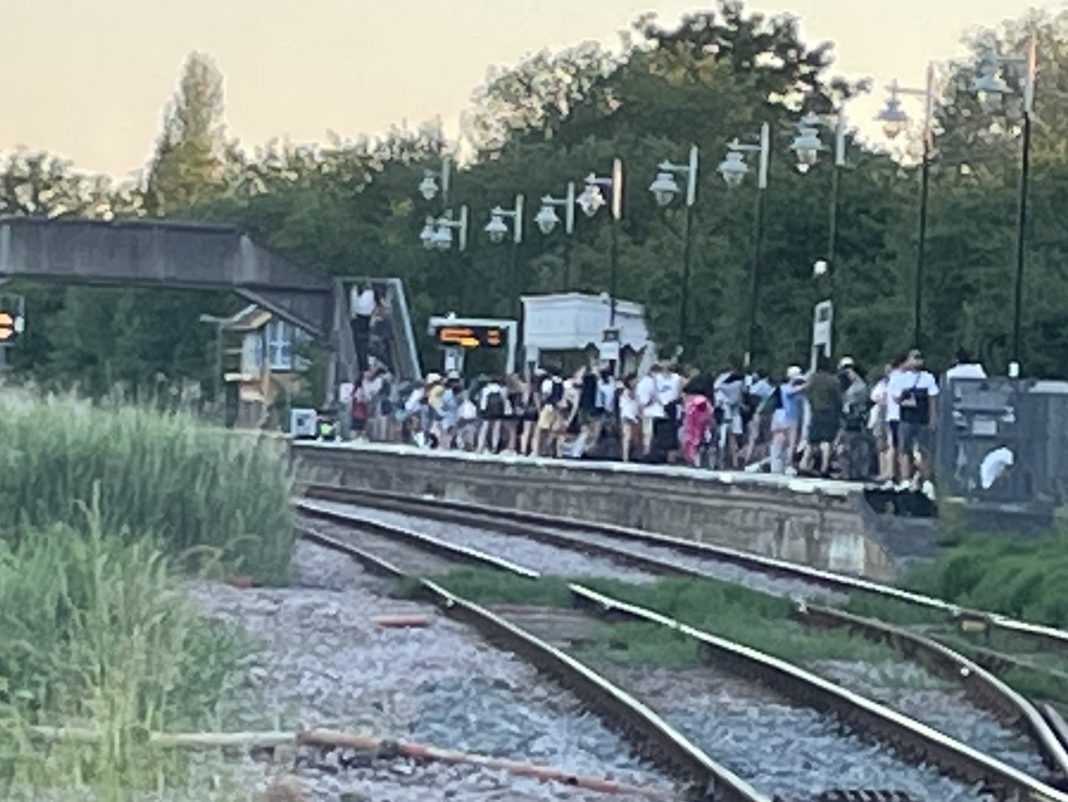If you have been travelling by rail recently, or if you have passed the station at the weekend around the time the trains arrive, you may have noticed that Rye is more popular than ever with visitors. The crowds thronging the platform and station approach seem to include a large proportion of young people, mostly couples and groups of friends in their 20s and 30s. Perhaps deprived of the multiple travel choices of the past, but keen to escape the city for a day or two, they are choosing to hop on a train to spend time walking the cobbles and paths around Rye.
To be an attractive destination for this age group shows that the town offers what today’s younger visitors are looking for; fine walks, interesting architecture, good food and beer, interesting shops you won’t find anywhere else. A final, important, point is that the town is accessible by train. This is important when you don’t have access to a car, a fact for many people, in particular those travelling from London.
All of this should be great news for the town and its businesses through the positive relationship that can be established with this new group of visitors. Hopefully they will enjoy their visit enough to return, and do so by train, so adding to the town’s vibrancy and economy without adding to traffic congestion and parking problems.
This, however, will rely on one important factor, a reliable and comfortable travel experience. If last weekend is anything to go by, this is an opportunity on which Rye could miss out. On Sunday a cancellation led to a two-hour gap in the service at a crucial point in the early evening. As travellers returned to the station they met unplanned delays, crowded platforms and standing-room only on subsequent trains where, despite the welcome provision of four-car trains, any attempt at social distancing was lost. For the two subsequent departures that I witnessed, the time it took for the crowds of travellers to squeeze on board, many with luggage and bikes, led to yet further delay and, presumably, further raised blood pressure as train connection times at Ashford were whittled away. For all involved this would have been an unpleasant and abrupt end to a lovely early summer weekend. Perhaps, next time, many will choose Folkestone or Margate with their more frequent, direct and more reliable service.
In our fast changing world, it seems rail services are struggling to keep up as we get back to a ‘new normal’. Whilst regular peak-hour commuting travel remains suppressed, off-peak daytime and weekend travel has bounced back. If you travel regularly on weekdays, it is not unusual to see relatively empty peak trains, to be followed by uncomfortably crowded mid-morning off-peak services as passenger demand continues to be distorted by pre-Covid-19 ticket pricing policies. We are left to wonder if the rail industry is taking a sufficiently serious approach to managing off-peak and weekend services. It seems not, with similar lack of forethought back in the spring, the Marshlink line was faced with a run of weekend and bank holiday weekend closures by Network Rail, just as demand for weekend travel rebounded with lockdown easing. It seems our railway industry, which we must acknowledge did keep going reliably through lockdown, is now coming up short of expectations.
This is something that’s not lost on the Marsh Link Action Group (MLAG) who have been continuing to liaise with the current operator, Southern, throughout this period of change.
All change!
If the current system seems unresponsive sometimes, there may be some cause for hope – or concern. A recent HM Government white paper, the Shapps-Williams review, promises to “transform the railways in Great Britain” in “the biggest change to the railways in 25 years”, the aim is to end the “fragmentation of the past and bringing the network under single national leadership”.
This new public body will be known as ‘Great British Railways’ and, when it has been set-up in 2023, they will own the infrastructure, receive the fare revenue, run and plan the network and set most fares and timetables. Great British Railways will contract with private companies to operate trains to the timetable and fares it specifies, in a way similar to that used by Transport for London (TfL) on its very successful Overground and bus networks. Whilst the end of the current fragmentation in railway management can only be welcomed, there are risks. Could centralising under one, remote, controlling organisation that is answerable directly to government ministers come at a price?
This is a particular concern when it comes to understanding and addressing specific local needs on relatively remote stretches of the network, such as our Marshlink line. There is no ‘Transport for London’ style organisation or strong metropolitan mayor looking after our transport interests.
So, aside from the re-branding with a ubiquitous ‘Great’ moniker, what would we like to see from our new British Railways organisation? Ideally we’d like to see new, more reliable trains, perhaps battery powered hybrid trains as a precursor to a full, more frequent and direct electric service to London. That would at last bring Rye (and Hastings) into the same league as the Kent coast.
What we don’t want is a distant, dead-hand in Whitehall condemning us to an unresponsive ‘tin-eared’ management by contract, more interested in controlling cost than providing a responsive service. This is where our local user groups, and representatives in government, could have their work cut out for them.
Image Credits: Kevin McCarthy .



